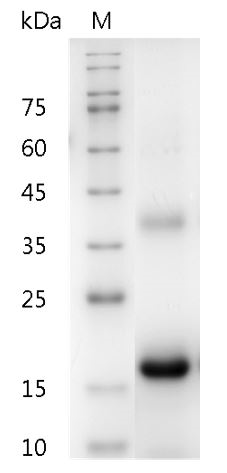| Product name | Mouse M-CSF protein, His tag (Animal-Free) |
| Sequence | Amino acid sequence derived from Mouse M-CSF (Lys33-Pro187)(P07141) was expressed with 6×His tag at the C-terminus |
| Applications | His tag |
| Applications notes | Mouse |
| Activity | Measure by its ability to induce proliferation in NFS-60 cells.The ED₅₀ for this effect is <2 ng/mL.The specific activity of recombinant mouse M-CSF is approximately >5 x 10⁵ IU/mg. |
| Protein length | The secreted Mouse M-CSF consists of 155 amino acids and has a predicted molecular mass of 19 kDa. |
| Preparation method | E. coli |
| Purity | >98% as determined by SDS-PAGE. |
| Alternative | CSF-1, MGI-IM |
| Formulation | Lyophilized from sterile PBS, pH 8.0 |
| Features & Benefits | Endotoxin:<0.1 EU per 1 μg of the protein by the LAL method. |
| Molecular weight | The protein has a calculated MW of 19.02 kDa.The protein migrates as 17-25 kDa under reducing condition (SDS-PAGE analysis). |
| Usage notes | Always centrifuge tubes before opening. It is recommended to reconstitute the lyophilized protein to a concentration of 0.1-1 mg/mL in sterile ddH2O, and keep at room temperature for at least 20 min to fully dissolve. Please avoid vortex vigorously |
| Storage instructions | Lyophilized Mouse M-CSF protein product should be stored desiccated below -18°C. Upon reconstitution, the protein should be stored at 4 °C between 2-7 days and for future use below -18 °C. For long term storage it is recommended to add a carrier protein (5% HSA , 10%FBS or 0.1%BSA). Please prevent freeze-thaw cycles |
| Shipping | Gel pack with blue ice. |
| Precautions | The product listed herein is for research use only and is not intended for use in human or clinical diagnosis. Suggested applications of our products are not recommendations to use our products in violation of any patent or as a license. We cannot be responsible for patent infringements or other violations that may occur with the use of this product. |
| Background | M-CSF (Macrophage colony-stimulating factor, CSF-1) is a survival factor essential for the proliferation and development of monocytes, macrophages, and osteoclast progenitor cells. M-CSF also induces VEGF (vascular endothelial growth factor) secretion by macrophages, thereby mediating mobilization of endothelial progenitor cells and neovascularization. M-CSF is present as several bioactive isoforms that differ in potency and stability. The full-length protein is synthesized as a membrane-spanning protein that can be expressed on the cell surface or further cleaved and modified in the secretory vesicle. |
| Alternative | CSF-1, MGI-IM |
| Accession | P07141 |

Fig.SDS-PAGE analysis of Mouse M-CSF protein
Author:Liu T, Chen D, Tang S Publication name:Inflammation IF:5.095
You must be logged in to post a review.
Reviews
There are no reviews yet.